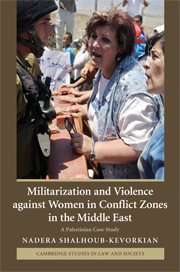 Militarization and Violence against Women in Conflict Zones in the Middle East
Militarization and Violence against Women in Conflict Zones in the Middle East Book contents
- Frontmatter
- Contents
- List of figures
- Acknowledgements
- 1 Introduction
- 2 Violent translations: women, war, and narrative in conflict zones
- 3 Veiled powers: conceptualizing woman and/as the ‘nation’
- 4 Women frontliners in conflict zones: a genealogy of weaponization
- 5 Speaking truth to power: voices of Palestinian women facing the Wall
- 6 Ruminations and final thoughts: women in-between
- References
- Index
2 - Violent translations: women, war, and narrative in conflict zones
Published online by Cambridge University Press: 23 January 2010
- Frontmatter
- Contents
- List of figures
- Acknowledgements
- 1 Introduction
- 2 Violent translations: women, war, and narrative in conflict zones
- 3 Veiled powers: conceptualizing woman and/as the ‘nation’
- 4 Women frontliners in conflict zones: a genealogy of weaponization
- 5 Speaking truth to power: voices of Palestinian women facing the Wall
- 6 Ruminations and final thoughts: women in-between
- References
- Index
Summary
On 7 September 2003, Wisam called my house in Los Angeles. I was spending my sabbatical year at the University of California Los Angeles Center for the Study of Women and Faculty of Law and the University of Southern California Faculty of Law. She called to remind me of the weekly counselling meeting with my team from the Family Defense Society (FDS) in Nablus, Palestine. Knowing that Wisam always speaks clearly and with joy in her voice and was usually thrilled to share their weekly activities and work plan with me, her low and sombre voice told me that something was wrong. When I called back to check on her and the rest of the team, they informed me that they were very busy with the recent catastrophe in Nablus. The Israeli Occupation Forces had demolished one of the buildings that we used as a counselling centre for our work with fifteen families. Others began to talk to me about the incident. Some spoke of the pain, others of the horror of such a crime against young children.
But it was Ula's voice that came through the boldest and the clearest. Ula is a mother of three who lost all she had when her apartment was demolished. She said:
I did not know what to do … all I did is search amidst the destruction for some memories: plates, pictures, medicine, clothes. Maybe I could find the baby's cradle … I needed to get my anger out, so I started fighting with my husband for not bringing the documents and money we had in the apartment. […]
- Type
- Chapter
- Information
- Militarization and Violence against Women in Conflict Zones in the Middle EastA Palestinian Case-Study, pp. 41 - 76Publisher: Cambridge University PressPrint publication year: 2009


